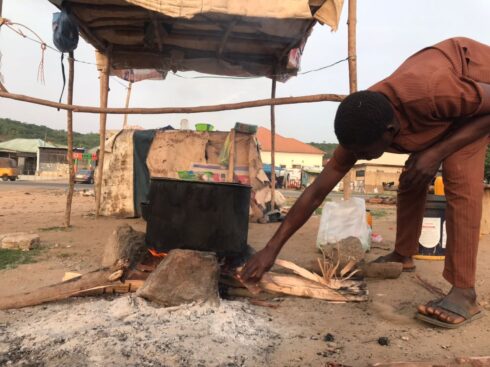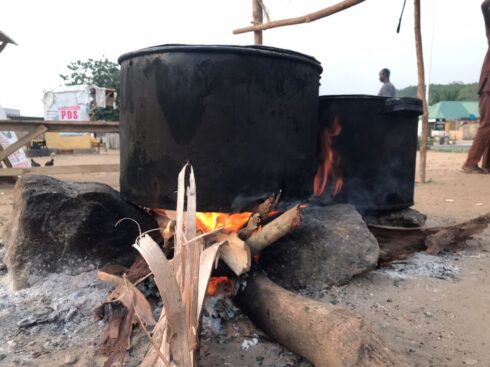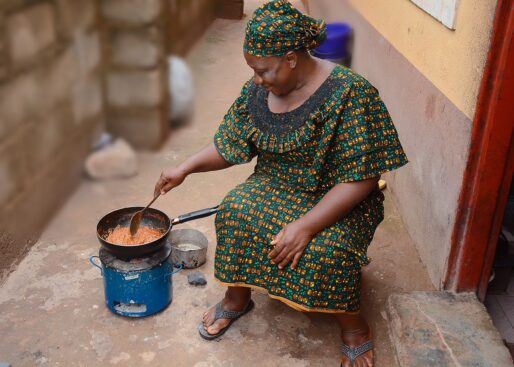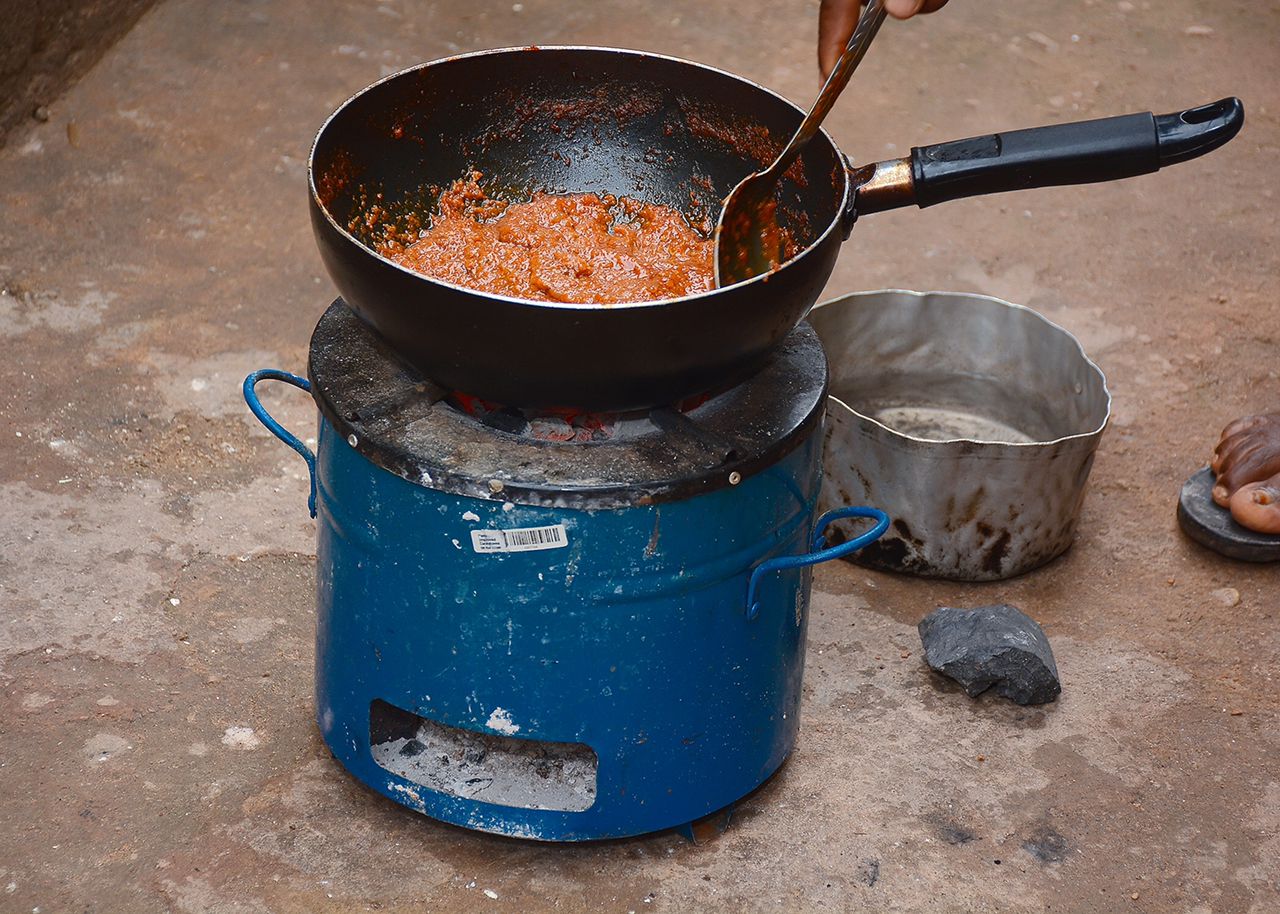In the bustling streets of Apo, Abuja, Haruna Seidu found his calling amidst the sizzle of street food. It was 2023 when necessity propelled him into the world of roadside cuisine, a venture borne not out of choice but out of the pressing need to provide for his family in the face of dwindling employment opportunities. With determination as his compass, Haruna set up his modest stall, armed with firewood and culinary prowess to cater to the hunger pangs of weary masons returning home after a hard day’s toil.
Each day, as the sun begins its descent, Haruna kindles the flames, using firewood as his trusty ally to brew steaming tea and concoct savory spaghetti dishes. Unbeknownst to him, the billowing smoke and crackling flames that dance beneath his pots carry with them a silent threat – a threat to health, to climate, to the very fabric of existence. Yet, amidst the aromatic haze that envelops his stall, Haruna is singularly focused on the immediate task at hand – satisfying the hunger of those who flock to his kiosk, seeking solace in a warm meal.
The rhythm of his days is marked by the steady shuffle of customers, some eager to exchange their hard-earned naira for a hearty meal, while others, burdened by financial constraints, seek refuge in credit promises, a debt to be repaid at a later date. Oblivious to the risks that linger in the air, Haruna stokes the fire with fervour, each log adding fuel to his culinary ambitions.
Yet, beyond the confines of Haruna’s makeshift kitchen, his story resonates with millions across Nigeria – a tale of resilience, of making do with what little one has, of finding warmth in the hearth even as cleaner alternatives remain elusive.
- Rivers people didn’t make mistake voting Fubara, group replies Wike
- Woman arrested for posing as police officer
THE LURKING DANGER

For generations, charcoal cooking has been a traditional method in Nigeria’s rural areas, sustained by the continuous felling of trees. However, the environmental toll is severe. According to data from the Global Forest Watch (GFW), since 2001, Nigeria has lost over 1.3 million hectares (Mha) of tree cover, translating to an annual loss of roughly 163,000 hectares (kha).
In Nigeria, deforestation has become a serious issue due to the rapid growth in population, coupled with the increasing demand for timber, fuelwood, and agricultural land, says Zacharia Buba Yaduma, Director General and Chief Executive Officer of The Forestry Research Institute of Nigeria. Nigeria’s primary drivers of deforestation is the rapid expansion in Agriculture.
“A lot of people in Nigeria are dependent on agriculture, thereby expanding farmland which leads to a significant loss of forests. Another cause of deforestation in Nigeria is logging, which is caused by corruption and weak law enforcement. Trees are being cut down for timber and fuel wood. And finally, urbanisation is also a major cause of deforestation in Nigeria, as cities continue to grow and expand, leading to the destruction of forests in urban areas,” Yaduma stated.
Moreso, the removal of petrol subsidies on May 29, 2023, has had a profound impact on various facets of life in Nigeria, notably affecting domestic cooking practices. The escalating cost of Liquefied Petroleum Gas (LPG), commonly referred to as cooking gas, has prompted a frenzied search for alternatives, often without regard for individual safety and environmental implications.
The National Bureau of Statistics (NBS) in its latest “Liquefied Petroleum Gas (Cooking Gas) Price Watch” report for March 2024 revealed a notable shift in the cost dynamics. Throughout the past year, the price for a 5kg cooking gas cylinder surged steadily, with the average retail refill price experiencing a month-on-month uptick of 7.10 percent. Starting from N4,610.48 in February 2023, the price climbed by 42.97% to N6,591.62 by March 2024, marking a significant increase.

Millions of African women are exposed to dangerous fumes and smoke from burning wood, charcoal, coal, agricultural waste, and animal dung as they cook over rudimentary stoves in poorly ventilated spaces for hours each day. This hazardous practice leads to 500,000 premature deaths in Africa every year, disproportionately affecting women and children, according to the International Energy Agency (IEA). The agency revealed that globally, approximately 760 million individuals still lack access to electricity, while a staggering 2.3 billion people continue to rely on outdated energy sources for cooking. Africa stands out as one of the regions most profoundly affected by this persistent challenge, underscoring the urgent need for sustainable solutions.
The inhalation of toxic fumes ranks as the second leading cause of death, contributing to up to 60% of early fatalities attributed to respiratory and cardiovascular diseases. The use of traditional cooking methods often requires spending significant time collecting firewood or other fuels, as well as cooking over open flames, which can be time-consuming and labor-intensive. This detracts from other productive activities such as farming or income-generating work, potentially impacting food production and economic stability at the household level.
In the struggle to expand access to clean cooking across sub-Saharan Africa, population growth looms as a formidable challenge, as highlighted in the July 2023 “Vision for Clean Cooking Access for All” report, a collaborative effort between the African Development Bank (AfDB) Group and other stakeholders. Despite some progress, with access rates climbing from 8% to above 15% between 2010 and 2022, the number of people without clean cooking solutions surged by a staggering 220 million over the same period. In this region, where nearly 1 billion people lack access, the pace of advancement has been outpaced by population growth, rendering the task increasingly daunting.
TRANSFORMING LIVES

In Kaduna, Elizabeth Hassan’s life took a significant turn in 2021 when she crossed paths with Olanike Daramola, founder of a local nonprofit dedicated to sustainable living. Little did she know, this encounter would lead her on a transformative journey towards cleaner, healthier cooking practices.
Introduced to the innovative concept of clean cook stoves by Daramola’s organization, Elizabeth embraced this new technology wholeheartedly. Unlike traditional cooking methods reliant on firewood, clean cook stoves offered a revolutionary solution. With their smoke-free operation, Elizabeth found her health and well-being vastly improved.
Beyond the health benefits, Elizabeth discovered additional advantages to using clean cook stoves. Unlike firewood, a popular alternative fuel source known for its pervasive odor, clean cook stoves provided a cost-effective solution without leaving behind any unpleasant smells on her cooking.
“Firewood was expensive and left everything smelling like burnt wood,” Elizabeth explains. “But with the clean cook stove, I save money and my food tastes better too.”
Elizabeth’s enthusiasm for clean cook stoves didn’t stop with her own household. Recognizing the remarkable impact this technology could have on her community, she became an advocate, spreading awareness and encouraging others to make the switch.
Her efforts have yielded tangible results. Not only have more families embraced clean cooking practices, but Elizabeth has also witnessed a cultural shift. What was once considered a household chore has become a symbol of care and consideration.
“Husbands now buy it for their wives,” Elizabeth shares proudly. “And just this morning, while I was at church, my customers were calling in, eager to place their orders. It’s truly heartwarming to see.”
As Elizabeth’s story illustrates, the journey to clean cooking isn’t just about adopting new technology—it’s about fostering a community-driven approach to sustainability and well-being. And with advocates like Elizabeth leading the way, the future of clean cooking in Nigeria shines brighter than ever before.
UNMASKING THE HEROES
Amidst this grim reality, a wave of change is sweeping across Nigeria, spearheaded by passionate individuals and organizations committed to clean cooking solutions. Olanike Olugboji-Daramola, whose non-profit is determined to promote clean cooking technologies in rural communities, is one of such persons.
In 2013, Olanike was awfully disturbed by a WHO report that disclosed over 98,000 Nigerian women perished annually due to using firewood for cooking. After conducting surveys in various Kaduna State communities, she discovered that the statistics mirrored the harsh realities faced by women in the region. She later established a partnership, leading to the launch of the Clean Cooking Stove Entrepreneurship project. This pioneering initiative involved a thorough two-week training programme for 30 women, empowering them with the necessary knowledge and skills to become advocates and entrepreneurs in clean cooking.
By extending access to clean cooking solutions to over 9,000 women throughout Nigeria, this initiative not only enhanced their quality of life but also contributed to a healthier and more sustainable environment. Women like Elizabeth Hassan returned to their communities with a dual purpose. They initiated awareness campaigns to educate locals about the importance of adopting clean cooking practices. Concurrently, they began selling affordable clean cooking stoves to low-income individuals in their areas.
The cooking stove operates through a specialized chamber where users can insert small dry charcoal pieces. This chamber includes a fiberglass layer to optimize heat retention and minimize charcoal usage. To start the stove, users only need to place a matchstick or lighter along with some dry combustible materials like paper and orange peel into the chamber, eliminating the need for kerosene. This ignition method efficiently primes the energy-saving stove, providing a cleaner and eco-friendly cooking alternative.
Similarly, electric stoves present a sustainable alternative, reducing dependency on fossil fuels and addressing indoor air pollution. However, their adoption encounters challenges in regions with limited infrastructure, such as Nigeria. The country’s unreliable power supply is a major obstacle, necessitating innovative solutions like solar-powered stoves to ensure consistent cooking access. Moreover, affordability remains a concern for many households, prompting efforts to make electric stoves more accessible through subsidies or financing options. Despite these barriers, the transition to electric cooking represents a promising advancement, blending tradition with innovation to foster a safer and more sustainable culinary environment for future generations.
Okey Esse, a self-taught serial social entrepreneur specializing in transforming raw ideas into sustainable strategies, has established himself as a pioneering product developer. His company has pioneered the world’s first and only 100% smokeless biomass cookstove, incorporating a built-in self-powered IoT cloud-based remote system. This system monitors, in real-time, a day’s worth of cooking activity, tracking metrics such as CO2 and biomass saved, prevented black carbon emissions, and total electricity generated. Esse firmly believes that this innovation has positively impacted communities. Reflecting on the transformation within communities where families once struggled with food insecurity and exposure to toxic smoke, Esse and his team are motivated to continue their efforts to improve livelihoods.
EMPOWERING COMMUNITIES
In the heart of rural Nigeria, communities are taking ownership of their destiny, empowered by innovative clean cooking solutions. Jumaima Ella leads a grassroots movement dedicated to promoting clean cooking technologies in rural communities.
“Our project, the Innovative Climate Financing, Project in Mararaba – Burum and Katampe, studied clean cooking adoption using remote sensor monitoring system,” says Jumaima.
“The project also piloted Innovative financial models for clean cookstove affordability in poor rural households in Nigeria where types of clean cooking technologies were piloted in 50 households to identify the preferred stove and the financial model was piloted in 100 households. With the Innovative financial model, adoption rate increased to 80% and 70% households were able to pay up for their clean cook stoves,” Jumaima revealed.
GOVERNMENT INITIATIVES
While grassroots efforts are crucial, governmental support is paramount in driving systemic change. Recognizing the urgency of the clean cooking crisis, in May 2024, the Nigerian government has approved the long-awaited National Clean Cooking Policy, which seeks to expand access to clean cooking energy solutions to all households and institutions in Nigeria by 2030. The National Clean Cooking Scheme aims to provide subsidies and incentives for the adoption of LPG stoves and other clean energy solutions, with a goal of reaching 50 million households by 2030.
Through its Energy Transition Plan, Nigeria aims to decarbonize its cooking sector by 2050, ushering in a new era of sustainability and well-being. Central to this strategy is a concerted effort to transition households from traditional fuels like firewood and kerosene to more efficient and cleaner alternatives such as Liquefied Petroleum Gas (LPG) and electric stoves. Moreover, the post-2030 focus on carbon-neutral technologies underscores Nigeria’s commitment to long-term sustainability, with initiatives like biogas production poised to play a significant role in rural electrification.
Crucially, the Electricity Act of 2023 lays down a roadmap for renewable energy integration within the power sector. Provisions within the Act pave the way for simplified licensing, favorable fee regimes, and feed-in tariff rates for renewable energy generators. By prioritizing renewable energy, such as solar and wind power, the Act aims to increase electricity generation capacity, which can in turn support initiatives for clean cooking technologies. Access to reliable electricity can enable the adoption of cleaner cooking methods, such as electric stoves or induction cookers, thereby reducing reliance on traditional biomass fuels like wood or charcoal, which contribute to indoor air pollution and deforestation.
CHALLENGES ON THE ROAD AHEAD
Despite the progress made, challenges loom large on the road to universal clean cooking access. Affordability remains a barrier for many households, particularly in rural areas where clean cooking technologies may be perceived as a luxury. Furthermore, infrastructure constraints, such as limited distribution networks for LPG cylinders, pose logistical challenges that must be addressed to ensure widespread adoption.
To truly ignite change, we must harness the collective power of innovation, advocacy, and collaboration to ensure that every Nigerian household has access to safe, clean, and efficient cooking solutions.
Enendu is a journalist at Trust Television, Abuja

 Join Daily Trust WhatsApp Community For Quick Access To News and Happenings Around You.
Join Daily Trust WhatsApp Community For Quick Access To News and Happenings Around You.

